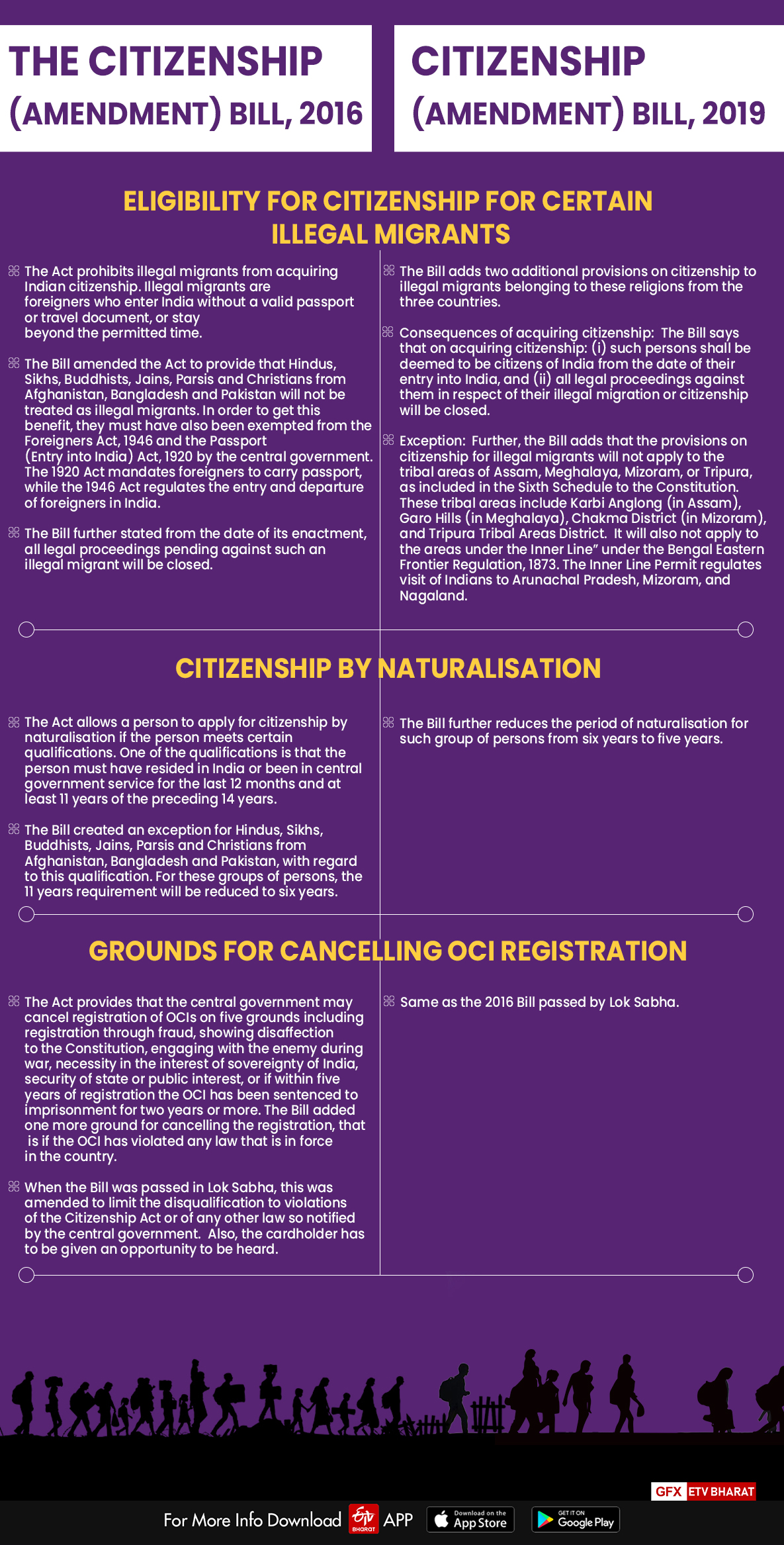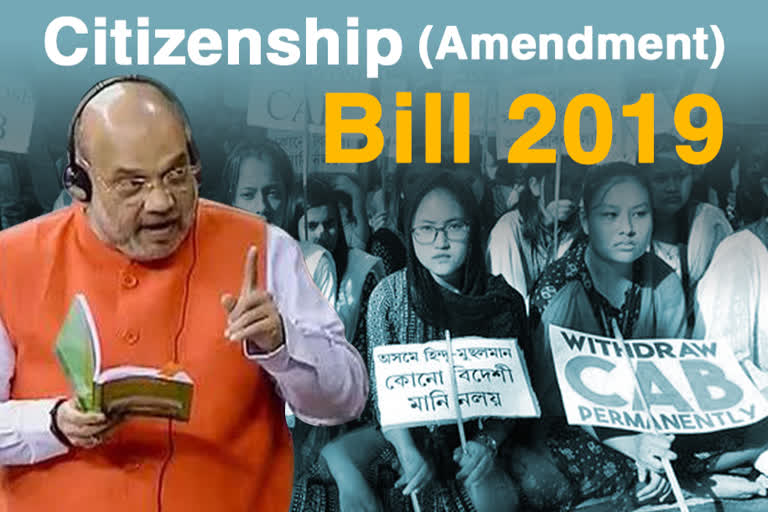Hyderabad: Amid massive uproar and protests from the Opposition, the Lok Sabha passed Citizenship (Amendment) Bill on Monday with 311 members favouring and 80 voting against it. The Bill was tabled by the Home Minister Amid Shah who justified that the Bill is not violating any article of the Constitution nor does it discriminate against any community. The CAB seeks to provide Indian citizenship to non-Muslim refugees from Pakistan, Bangladesh and Afghanistan (if they faced religious persecution there), who came to India on or before December 31, 2014.
Let us know more about Citizenship (Amendment) Bill 2019
Background
This Bill was first time introduced in the Lok Sabha on July 19, 2016 and was referred to the Joint Parliamentary Committee on August 12, 2016. The committee submitted its report on January 7, 2019 and the bill was passed in the Lok Sabha on the next day after it was introduced by the then Home Minister Rajnath Singh.
While the Bill awaited passage in Rajya Sabha, it had lapsed after the dissolution of the 16th Lok Sabha because as per the parliamentary procedure, if a bill gets cleared in Lok Sabha but couldn’t pass in Rajya Sabha then it has to be re-introduced in both the houses. The Bill was pushed aggressively by the current government due to the BJP's election manifesto which promised to grant citizenship to Hindu refugees persecuted in the neighboring countries, during the 2014 General Election.

What is Citizenship (Amendment) Bill 2019?
The Bill seeks to amend the Citizenship Act, 1955 to make six minority communities- Hindu, Sikh, Buddhist, Jain, Parsi and Christian from Afghanistan, Bangladesh, and Pakistan eligible for Indian citizenship. The Bill will enable people from these communities to get Indian citizenship in six years as opposed to 11 years.
Who is eligible?
The Bill applies to those who were “forced or compelled to seek shelter in India due to persecution on the ground of religion”. The goal of this legislation is to protect such people from proceedings of illegal migration. The cut-off date for citizenship is December 31, 2014, meaning the applicant should have entered India on or before that date.
The Bill also makes amendments to provisions related to OCI cardholders. A foreigner may register as an OCI under the 1955 Act if they are of Indian origin (e.g., former citizen of India or their descendants) or the spouse of a person of Indian origin. This will entitle them to benefits such as the right to travel to India, and to work and study in the country. The Bill amends the Act to allow the cancellation of OCI registration if the person has violated any law notified by the central government.
Is the bill applicable throughout India?
The Bill states that the provisions on citizenship for illegal migrants will not apply to the tribal areas of Assam, Meghalaya, Mizoram, or Tripura, as included in the Sixth Schedule to the Constitution. It will also not apply to the regions protected by the Inner Line Permit (ILP). As per the Bengal Eastern Frontier Regulation 1873, citizens of other states require ILP to visit the three states- Arunachal Pradesh, Mizoram and Nagaland.
Why opposition parties disagree?
The biggest concern of the opposition parties is that the Bill is specifically targeting the Muslim community. Opposition parties also pointed out that the legislation is violating Article 14 of the Constitution, which speaks of the right to equality. MPs who took a stand against the bill included- Adhir Ranjan Chowdhury, Saugata Roy, NK Premachandran, Gaurav Gogoi, Shashi Tharoor and Asaduddin Owaisi. Owaisi tore up a copy of the bill, calling it “worse than Adolf Hitler’s laws”. Chowdhury, leader of the Congress in the Lok Sabha, said, “We are opposing the bill because it is discriminatory and regressive in nature." While Tharoor said, "It is an assault on the foundational values of our Republic."
Why North-East states are staging protests?
The Northeast States staged a protest against the Bill as it will nullify the provisions of the Assam Accord of 1985. The Assam Accord fixed March 24, 1971, as the cut-off date for deportation of all illegal immigrants, irrespective of religion. Northeast States oppose the CAB saying that granting citizenship to foreign refugees might create demographic or ethnic changes there.
What are the provisions for illegal migrants?
According to the Citizenship Act, 1955, illegal migrants can either be kept in jail or sent back to their country under the Foreigners Act, 1946 and the Passports (Entry into India) Act, 1920. But in 2015 and 2016, the central government has made some amendments in the laws of 1920 and 1946. It exempted Hindus, Sikhs, Buddhists, Jains, Parsis and Christians from Afghanistan, Bangladesh and Pakistan to stay in India. It means that if people belonging to these communities live in India without valid documents, then they can neither be imprisoned nor deported. This exemption has given to those religious groups who have reached India on or before 31 December 2014.
ALSO READ: 11-hr Northeast bandh begins to protest against CAB



